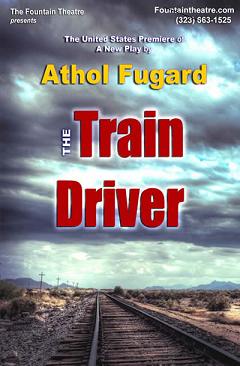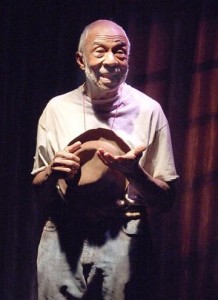
LIFE GOES ON, DOESN’T IT?
The cemetery is the home of the nameless and it is strewn with pebbles and bits of garbage that serve as headstones. The keeper of the cemetery lives next to it in a shed that is equipped with not even the barest essentials. In this world of death, one does not expect to find much recognizable humanity. Indeed, Jeff McLaughlin’s arid and grim plot of land and its barren lean-to could just as easily be right for a play by Samuel Beckett. But this is not Beckett; this is the world of Athol Fugard’s The Train Driver, and Fugard, though always grittily realistic, is the last of our theater’s true humanists. What he has in common with Beckett is a profound sense of the personal and collective guilt men must wade through on the path to redemption and a commitment to the music people arrive at through language. Most of the time, redemption does not come to his characters as much as it comes to us, the audience, at that moment when we finally begin to live inside those characters.

Fugard, in his plays – like Nadine Gordimer, in her novels and short stories – has been our most reliable observer of life in South Africa through apartheid (when we listened with such a keen desire to learn about a world beyond our true understanding), to the post-Mandela world, when, at first, we imagined that all problems would simply go away. What has been lost in the work of both Fugard and Gordimer is the urgency of life under apartheid, but what has been gained is the understanding that nothing goes away that has been under siege and festering for so long. There seems to be no end to the tragedies which engulf the lives of the objects of Fugard’s and Gordimer’s concern. Neither age nor political change has tempered the wisdom and the acute sense of compassion these artists bring to their work.
 It is good to have another Athol Fugard play in our midst.
It is good to have another Athol Fugard play in our midst.
It is even better that The Train Driver is not only as good as it is, but that the Fountain Theatre production is giving the play its proper due. Perhaps the play lacks the breadth of works like A Lesson From Aloes and Master Harold and the Boys, but, in returning to the mood of a play like Boesman and Lena, Fugard is working from a deeper, quieter, and, from this reviewer’s point of view, slightly more resonant place within himself. Rarely has Fugard’s language been more tinged with the poetry of heartbreak.
The story is simple. Roelf Visagie, an Afrikaner, is the conductor of a train which has run over a woman and her child, and, although there is evidence that the woman had placed herself in danger of being killed, his anguish – the play could have been called The Passion of Roelf – is monumental. He desperately wants to find out in which unmarked graves the woman and her child have been buried, as if, somehow, that knowledge alone would bring him closer to the darker truths that are crowding around his fevered brain, and free him from his torment. Simon Hanabe, whose job it is to watch over the graveyard, offers some solace to Roelf, but he is not an adversary as much as he is a nearly silent observer, too aware, after living so long without history, that nothing changes except perhaps learning to live in as dignified a way as is humanly possible with whatever pain the forces of nature and the forces within ourselves inflict upon us.
Morian Higgins makes of Roelf such a bitterly despondent and emotionally savage example of self-destruction that the theater practically shakes with the power of his anger and his sadness; this is acting at its most intensely concentrated and driven by the transforming musicality of Fugard’s prose. But it is Adolphus Ward, as Simon, who centers the play and gives it its beating heart; Ward does not have to do much, because this is the happiest combination of a subtly drawn character and an actor who seems to become that character just by standing by and observing the situation with muted detachment and the sense that he has seen this all before and will see it all again.
 The production is as good as it is because, in Stephen Sachs, Fugard has the director every playwright dreams of finding: one who totally understands every grace note, every signpost, every unspoken gesture, and, through care and sensibility, brings them to life; in short, Sachs’s direction is sublime.
The production is as good as it is because, in Stephen Sachs, Fugard has the director every playwright dreams of finding: one who totally understands every grace note, every signpost, every unspoken gesture, and, through care and sensibility, brings them to life; in short, Sachs’s direction is sublime.
Time will tell which Fugard plays are better than others, but it’s not a point you should worry about too much. Any play by Fugard is an important event in the theater and The Train Driver is heart-stoppingly beautiful.
photos by Ed Krieger
The Train Driver
The Fountain Theatre, 5060 Fountain Ave. in Hollywood
ends on December 12, 2010
for tickets, call (323) 663-1525 or visit Fountain

